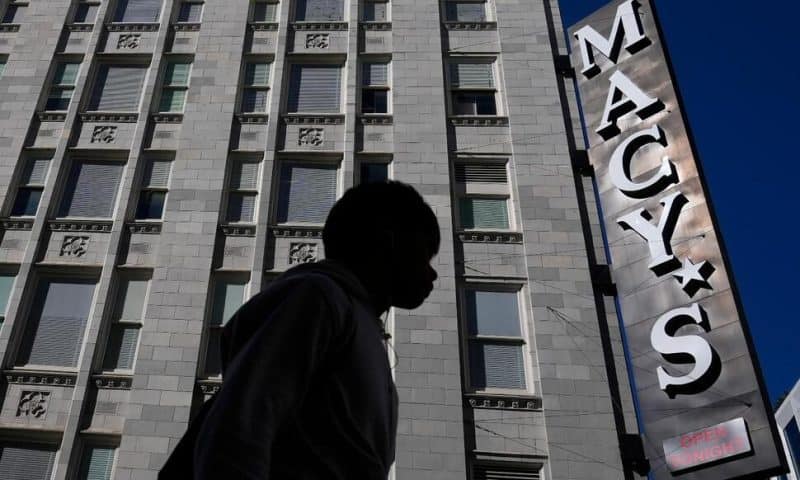Macy’s sales and profits fell during the first quarter as higher costs and other financial challenges had customers pulling back on spending
NEW YORK — Macy’s sales and profits fell during the first quarter as higher costs and other financial challenges had customers pulling back on spending.
Yet the quarterly results Tuesday beat Wall Street expectations. And Macy’s, which also operates upscale Bloomingdale’s and beauty chain Bluemercury, said it is seeing a positive impact from its turnaround efforts that include closing underperforming stores and upgrading others. Macy’s also raised its annual outlook.
Americans are still spending but they’re getting more selective and are also more likely to wait until something goes on sale. Retailers are also seeing higher delinquency rates in their credit card businesses.
CEO Tony Spring, who took over in February, said that all income groups are being more thoughtful with their spending. Bloomingdale’s, for example, registered weaker sales in luxury handbags and shoes as consumers shift to less expensive collections.
Higher income customers are focusing on their interests and passions, Spring said, while customers in the lower tier are starting to make choices increasingly with rent and family obligations in mind.
“I expect the consumer to remain under pressure,” Spring said during a call with industry analysts Tuesday. “We’ve got a big year in front of us. Maybe there will be rate cuts. But it’s an uncertain environment, and I think our job is not to assume anything different on the things we don’t control.”
Macy’s is accelerating the expansion of its new, small-format stores, while closing locations where sales have lagged.
The company is opening 30 small-format locations through the fall of 2025, nearly tripling the current count to roughly 42. Macy’s believes the smaller stores are more convenient for customers. It’s closing 150 unproductive stores over the next three years, a third of them by end of 2024.
At the same time Macy’s is upgrading its remaining 350 traditional stores, adding more salespeople to fitting areas and shoe departments, and adding more visual displays. It is also pivoting more to luxury sales, which have held up better overall. Macy’s said it will open 15 higher end Bloomingdale’s stores and 30 luxury Bluemercury cosmetics locations to cater to customers seeking higher end services and goods.
Macy’s reported earnings of $62 million, or 22 cents per share for the quarter ended May 4. That compares with $155 million, or 56 cents per share in the year-ago period.
Adjusted per share earnings were 27 cents, or 11 cents better than Wall Street was looking for, according to a survey by FactSet.
Revenue dipped 2.7% to $4.85 billion, but that also topped analyst projections of $4.82 billion,
Comparable store sales— those from online channels and from established stores — fell 1.2%, excluding licensed businesses like cosmetics and its third-party marketplace.
Macy’s comparable sales fell 1.6%. Bluemercury comparable sales jumped 4.3% and Bloomingdale’s comparable sales rose 0.8%.
Macy’s said that its first 50 traditional locations that have been revamped achieved comparable sales gains of 3.3% in the quarter, excluding licensed and third-party businesses. Spring calls them the “leading indicator” of its business in the future.
Quarterly credit card revenues declined by $45 million to $117 million, Macy’s said, in part due to higher delinquency rates.
Macy’s is under pressure by investors to accelerate growth. In April, it named two independent directors to its board backed by Arkhouse Management, ending for now a push by the activist investor to replace most of the board and eventually, acquire the iconic department store chain.
Macy’s shares fell less than a percent in early trading.

